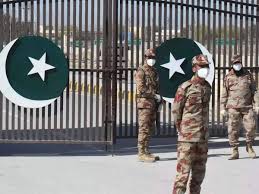A web of injustice silently weaves its threads in the shadows of the 1952 Pakistan Army Act, ensnaring unsuspecting civilians in a legal quagmire wherein their rights precariously hang in the balance. The act was predominantly designed to regulate the conduct of military personnel, outlining their rights, obligations, and disciplinary measures. However, in the aftermath of the 2014 APS attack, the military establishment and the political parties jointly decided to establish military courts, under a constitutional amendment, to try civilians –for a limited number of offenses. Civilians have unwittingly become entangled in its grasp, nonetheless.
The events of 9th May 2023 appear to have further exacerbated that process wherein civilians, in the spur of the moment(s) and raging emotions in the aftermath of their former prime minister’s unlawful arrest, took to the streets and retaliated against the country’s establishment in a manner that was the first of its kind –attacks were carried out against various military installations, monuments, houses, and the like. In a sternly written statement, the Inter-Services Public Relations (ISPR) strongly condemned it, positing that it would not permit the civilians to take the law into their own hands, referring to the protestors’ stance as “an example of hypocrisy.” The media wing further ensured strict action against the protestors. As per the statement released by ISPR, those involved in the above “will be brought to justice through trials under relevant laws of Pakistan including Pakistan Army Act and Official Secret Act.”
However, it should be noted that the violations above (from defiling to mutiny to rioting and unlawful assembly) are covered extensively under the Pakistan Penal Code. Therefore, the intent to try civilians in military courts under the acts mentioned above appears to be unconstitutional in the sense that, if carried through, it would be in direct violation of the Constitution of Pakistan –specifically its Article 10a, which provides the citizens of Pakistan with the Right to Fair Trial. In addition, who is to protect other fundamental rights of the civilians while due process is essentially compromised, justice hindered, and fair and legal treatment reduced to a mere dream –and a distant one. Over the past few weeks, various examples of civilians’ fundamental rights being curbed unlawfully have been made, evident in the storming of the houses of several opposition leaders, including those at rather odd hours, their arrests, rearrests, and detainments despite court orders suggesting otherwise as well as in the violence, detainment, and forced disappearance of journalists –i.e., Imran Riaz Khan, and activists –i.e., Tayyaba Raja. However, the aforementioned appears to be just the tip of the iceberg.
In addition to being unconstitutional, the measures would violate Pakistan’s international agreements about human rights. Pakistan has ratified the International Covenant on Civil and Political Rights (ICCPR); its Article 14 protects the citizens’ right to a fair trial in front of a “competent, independent, and impartial tribunal established by law.” Dinushika Dissanayake, Deputy Regional Director for South Asia at Amnesty International, went as far as to say that the trial of civilians at military courts is “contrary to international law.” She stated, “This is purely an intimidation tactic, designed to crack down on dissent by exercising fear of an institution that has never been held to account for its overreach. Several provisions under ordinary criminal laws can be used to prosecute vandalism and destruction of public property. The right to a fair trial, guaranteed by Pakistan’s constitution, is severely undermined by this move and cannot be justified. It must be struck down immediately“.
Pakistan and its authorities bear an international obligation to protect its citizens’ human rights, which is directly contradicted by their intention to try civilians in military courts. In addition to the right to a fair trial being compromised, rights such as assembly and freedom of speech are being curbed; for instance, the ban and blockage of social media for nearly four days is a testament to that. Usage of tear gas, stone pelting, charging at citizens with batons, and physical harassment of women and children further speak to the same.
In the wake of the Pakistan Army Act’s unintended consequences on civilians, urgent action is needed to address the pressing issue and advocate for change. The plight of those affected must be brought to light, raising awareness and compelling the government to review and reform the act to ensure the protection of rights and freedoms for all individuals. A united front of civil society organizations, activists, and concerned citizens must rally together to achieve this.
Engagement with international human rights organizations is crucial, as their expertise and influence can play a pivotal role in pressuring the government to enact reforms and ensure compliance with international human rights standards. Sharing our concerns and seeking their support can amplify our collective voice and strengthen the call for justice.
The Pakistan Army Act was never intended to infringe upon civilian rights. However, its unintended consequences have trapped countless individuals within a system that undermines their fundamental rights and freedoms. Our moral obligation is to demand justice and advocate for change, working tirelessly to expose the injustice, dismantle the web that ensnares civilians, and restore the principles of fairness and equality within Pakistan’s legal system. Through these efforts, we can ensure that justice prevails for all, irrespective of their civilian status. And lastly, it ought to be understood that we are all citizens of Pakistan irrespective of what section and faction the nature of our professional engagements places us in, wherein none is above the other. If there ever is the slightest of chances for Pakistan to succeed on some, if not all, fronts, it is if ALL parts of the country worked together.
Together, to gather Pakistan!
Assawer Toheed is a student of Politics and International Relations, at Quaid-i-Azam University. She hopes to expand further on the knowledge of global affairs, adding to what is taught at University; which she believes can be done best via being in a loop of reading, analyzing, and writing. Her predominant area of interest in terms of academia is Middle Eastern Politics.
She also harbors love a great for mountains!







